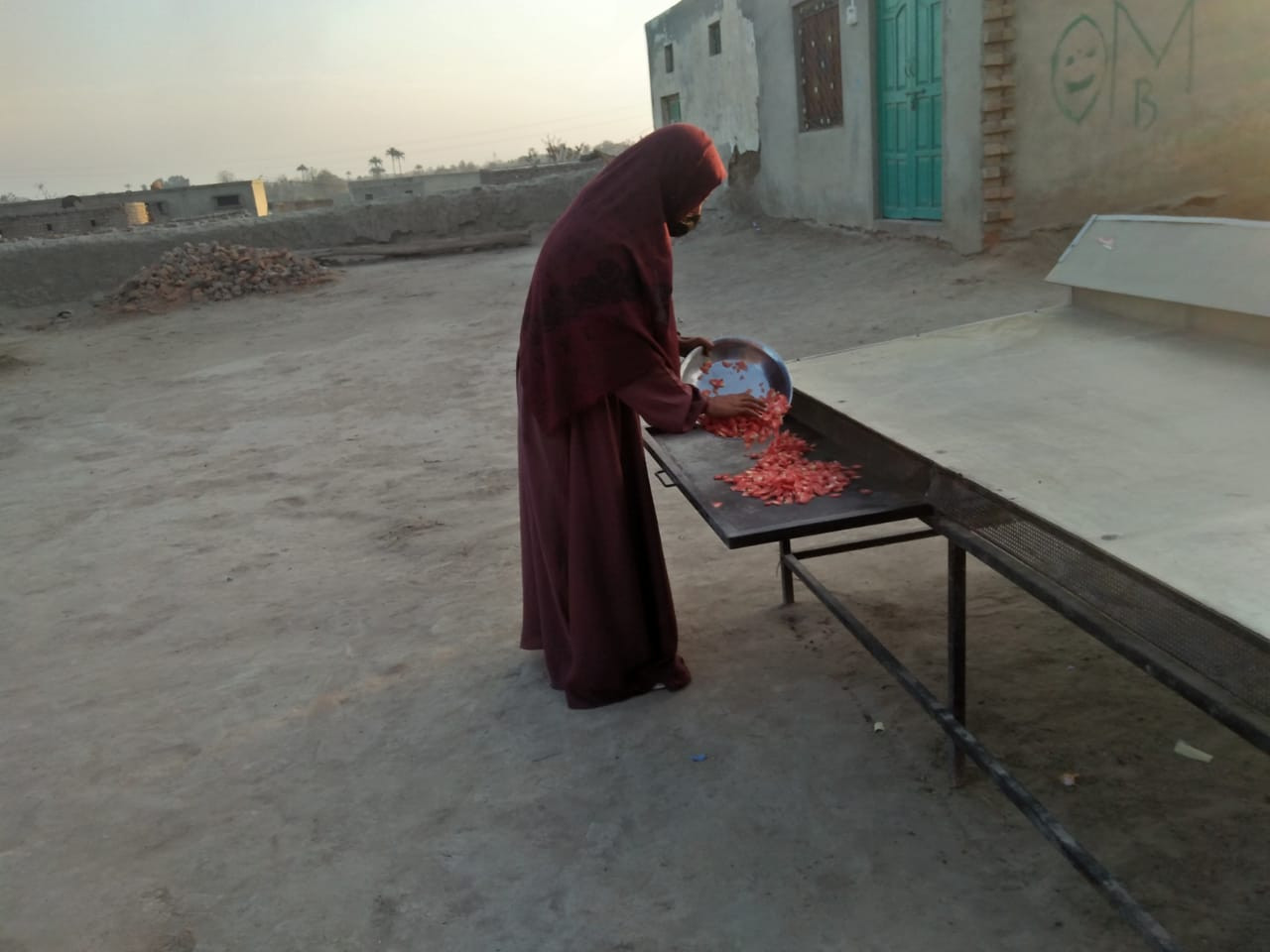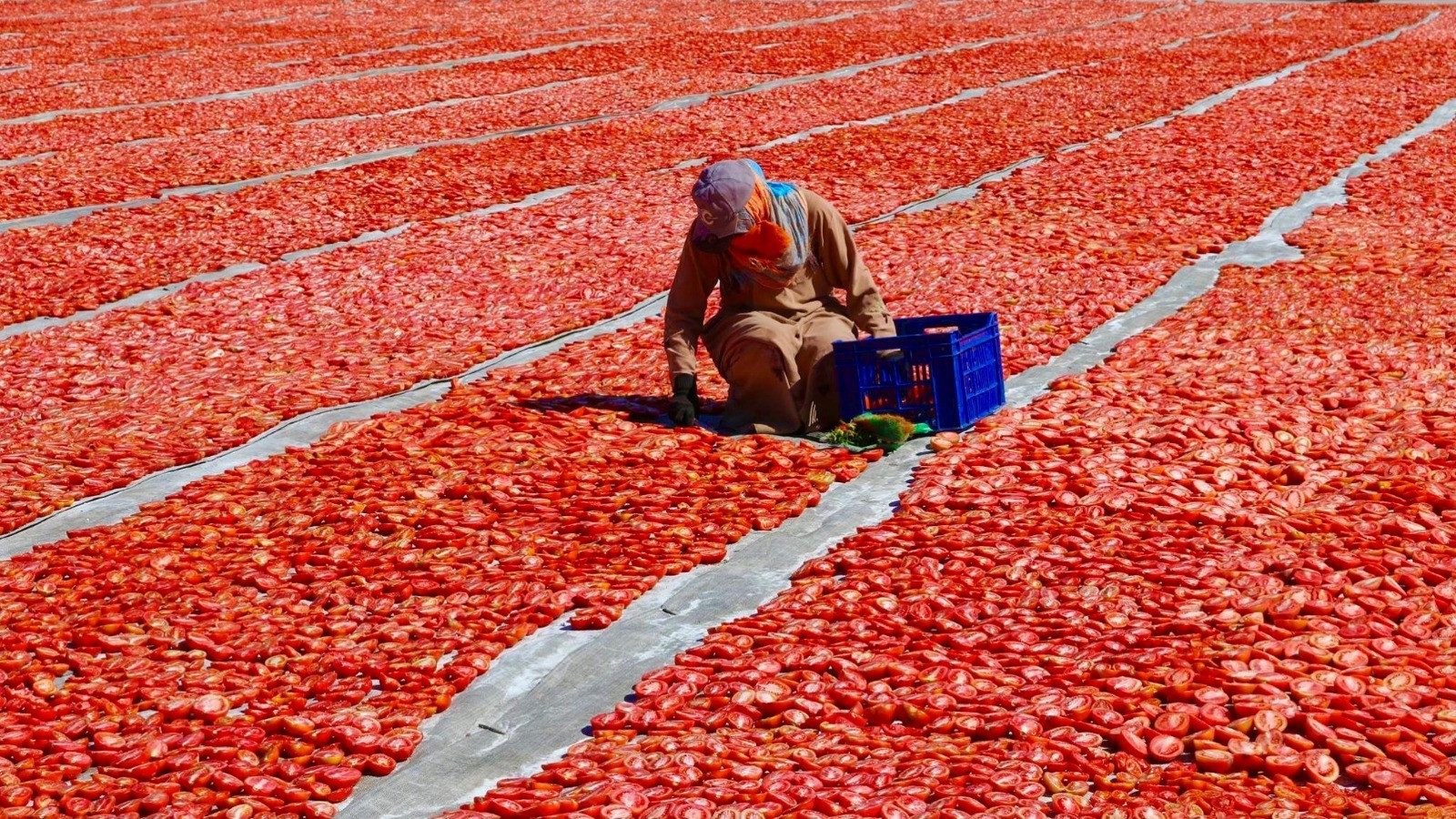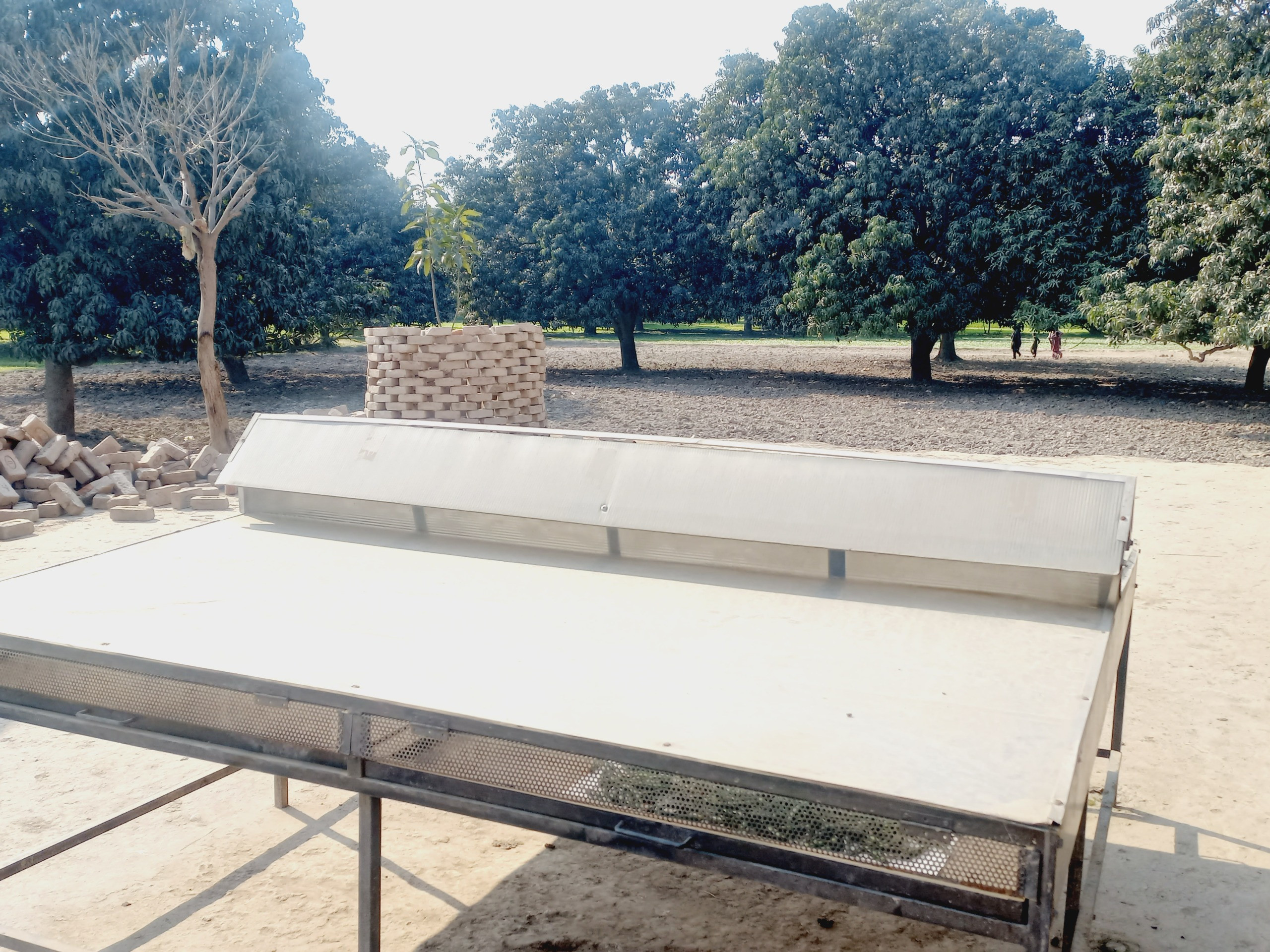Year after year, Pakistan faces an unrelenting onslaught from the ever-worsening effects of climate change. If its not torrid rains that drown the country, the summers usher in sweltering heat waves, like the one weather authorities predict will hit us next week. Hanging in the balance is Pakistan’s agrarian economy and the livelihoods that depend upon it.
While the country’s hot climate parches the earth, it also provides the seeds of opportunity. The same sun that drains the life out of Pakistan’s people also nourishes the fertile soil, making it an ideal breeding ground for a plethora of crops. The country's agricultural sector for now seems to thrive in the warm temperatures, producing an abundance of fresh produce that feeds the nation.
Meanwhile, in some parts of the country, the centuries-old art of sun drying appears to ben enjoying resurgence. A group of women and men from some small villages have formed a cooperative to produce sun-dried vegetable, spices and fruits. With their skilled hands and the relentless sun, they're turning a traditional practice into a thriving business, empowering themselves and their community in the process. From juicy mangoes to fragrant herbs, the country's farmers and artisans have mastered the art of harnessing the sun's power to preserve nature's bounty.

Elevating cuisine
In the world of cuisine, sun-dried food items are unsung heroes, adding depth and complexity to dishes, and elevating the humblest of ingredients into a culinary masterpiece. They're the secret ingredients in your favourite recipe, the surprise element that makes taste buds dance with joy, and the comforting warmth that wraps your senses in a cosy embrace.
From sun-dried tomatoes and apricots to herbs like basil and oregano, these ingredients add depth and richness to various dishes, making them a staple in many cuisines around the world due to their intense flavour profiles, chewy textures, high nutritional value, long shelf life and versatility in cooking and baking.
Rich tradition
Sun-dried food items hold a rich cultural and historical significance in Pakistan, dating back to the Mughal era when drying fruits and vegetables was a common practice to preserve food for the winter months. This traditional method of preservation was passed down through generations, with different regions developing their unique recipes and techniques.
In Pakistan, sun-dried food items are an integral part of the country's culinary heritage, with various types of dried fruits, vegetables, and spices being popular across different regions. Some of the most popular sun-dried products include dried fruits like apricots, mangoes, and dates, dried vegetables like tomatoes, chilies, and cauliflower, and spices like cumin, coriander, and turmeric.
Despite their cultural significance, sun-dried items are not commonly used in household kitchens in Pakistan, with fresh produce being preferred for daily cooking. However, some restaurants and chefs are now incorporating sun-dried ingredients into their recipes, recognising their unique flavour and texture profiles.
The global food landscape is witnessing a significant shift towards organic and sustainable products, driven by consumer awareness and demand for healthier, environmentally friendly options. The global market for sun-dried foods is projected to reach $12.6 billion by 2025, driven by consumer interest in healthy and environmentally friendly products. This trend presents a lucrative opportunity for countries like Pakistan to tap into the global market and promote sustainable agriculture practices.
Pakistan has immense potential to tap into this market, with its favourable climate and agricultural resources making it an ideal location for producing high-quality sun-dried food items. By leveraging this opportunity, Pakistan can not only promote its cultural heritage but also generate revenue and also as a means of empowering rural women through sustainable livelihoods. By leveraging its favourable climate and agricultural resources, Pakistan can capitalise on the growing demand for organic and sustainable products, while also promoting gender equality and rural development through the empowerment of women in the sun-dried food industry.
In local markets, there is also a growing demand for sun-dried food items, particularly among health-conscious consumers and those seeking traditional and organic products. By targeting these markets, Pakistani producers can create a sustainable and profitable business model that showcases the country's rich culinary heritage.

Empowering rural women
In the rural villages of Pakistan, a quiet revolution is taking place. Women who were once bound by traditional gender roles and limited economic opportunities are now finding empowerment through sun-dried food production. This has helped these women overcome these challenges by providing a sustainable source of income, empowering them to take control of their finances and make independent decisions, allowing them to work from home, balancing domestic responsibilities with economic activity, and building confidence and social connections through collective production and marketing efforts.
In an encouraging display of corporate social responsibility, companies like Standard Chartered Bank and The British Asian Trust are empowering women in rural areas to turn their skills and time into tangible earnings. Through their collaborative efforts with partners Shirakat and Sindh Agricultural & Forestry Workers Coordinating Organisation (SAFWCO), they have successfully implemented the Agripreneurs project, which has transformed the lives of countless women in Sindh and Punjab.
In the first phase of the project, which began in 2021 right after COVID, trained the women with the skills of sun drying and preserving the vegetables, fruits and spices to increase their life. Whereas, the second phase focused on nurturing high-performing participants from the previous phase, providing them with advanced training in business growth, marketing, quality assurance, and digital literacy. This investment paid off, as their revenues soared by 25%. Additionally, 300 new participants were welcomed into the program, receiving basic enterprise development training to kick-start their entrepreneurial journey.
Samina Javed, Program Manager at Shirakat, highlights the significance of empowering women who work from home without fair compensation. “We wanted to bring them into the economic cycle and acknowledge their work, enabling them to earn a decent income,” she said while emphasising the importance of preserving food, especially in areas like Gilgit-Baltistan, where agriculture is limited due to harsh weather conditions for six months of the year.
Shirakat's initiative focuses on supporting women who work in fields but receive no benefits, despite shouldering household responsibilities. By providing solar dehydrators and training, women can now dry food items and package them effectively while staying at home. This not only saves time but also increases their earning potential. “We taught them proper packaging techniques to preserve food for a longer duration and also trained them on cutting and drying processes,” said Samina.
To promote their products, Shirakat organised an Agri-fare in Islamabad, giving these women exposure to potential customers. Additionally, they provided training on digital marketing for those with smartphones. Samina highlights the vast market potential in Pakistan, where all four seasons yield a variety of fruits and vegetables. “Even when there's a shortage of fresh produce, sun-dried items fill the gap, and their shelf life is impressive,” she said.
To further enhance their efforts, Standard Chartered Bank and the BAT collaborated with Shirakat to provide them 120 solar dehydrators. These dehydrators where distributed among the men and women working under Shirakat. They formed Business Interest Groups (BIGs) of five people, including four women and one man, providing each group with a solar dehydrator. This enabled them to work together to produce high-quality sun-dried products.
Samina informed that to keep the motivated and respect the work they are doing, the groups receive payment first, followed by packing and distribution. “Launched in 2021, this initiative has reached areas like Sheikhupura, Muzafargarh, Gujjar Khan, and Taxila, benefiting 750 individuals, including 500 women,” she added.
By supporting businesses that cater to high-demand products like chillis, vegetable and fruit drying, and fodder production, these organisations are not only promoting economic growth but also addressing food security and sustainability in the region. Through initiatives like Agripreneurs, we can create a more equitable and prosperous future for women in rural areas, enabling them to thrive and contribute to their communities in meaningful ways.

Solar dehydration as a game-changer
Solar dehydration has been a game-changer for these women, making the sun-dried food production process more efficient and sustainable. With solar-powered dehydration units, they can now dry fruits and vegetables faster and more evenly, reducing spoilage and increasing quality, work during the day, even in extreme weather conditions, without relying on fuel or electricity, and increase their production capacity, meeting growing demand and expanding their customer base.
Sakina*, a mother of three who was struggling to make ends meet after her first husband's passing, found a solution in sun-dried food production, using her family's ancestral recipes to create delicious and nutritious products. Her story is not unique. Many rural women face challenges including, limited access to education and job opportunities, gender-based discrimination and societal expectations, heavy domestic workload and childcare responsibilities and limited financial resources and control over household income.
Sakina had always been passionate about preserving fruits and vegetables through sun drying. She learned the traditional technique from her mother and grandmother, who would spread the produce on mats or trays and leave it under the scorching sun for days or weeks. However, the process was not without its challenges. She would often spend hours every day monitoring the produce, turning it to ensure even drying, and protecting it from the elements. Rainy days would ruin entire batches, and the constant dust and insect infestations would affect the quality of the final product. Despite her best efforts, Sakina struggled to produce consistent and high-quality sun-dried foods.
When a local organisation introduced Sakina to solar dehydration technology, she was sceptical at first, but the promise of faster and more controlled drying conditions intrigued her. With the help of the organisation, Sakina installed a solar dehydration unit in her backyard. The impact was immediate. Sakina with her group of female workers could now dry the produce in a matter of hours, rather than days or weeks. The automated system ensured consistent and controlled drying conditions, reducing the risk of spoilage and contamination. The quality of her sun-dried foods improved significantly, and she could now produce a wider variety of products, from dried fruits to spices and herbs.
Sakina's business flourished, and she became a local entrepreneur, supplying sun-dried foods to markets and restaurants in the region. She was proud of her independence and the fact that she could now support her family without relying on her husband's income alone. The solar dehydration technology had empowered her to take control of her business and her life.
"My wife has always been a hardworking woman, but with the solar dehydration unit, I've seen her confidence and independence grow exponentially," says Sakina’s second husband, Usman Qazi. "She's now able to provide for our family in a way that was previously unimaginable, and I couldn't be prouder of her."
“She has not only been able to make a living for her own self, but have included and trained other women of the village, which is encouraging to see,” he said.
Sakina is no longer limited by the whims of the weather or the constraints of traditional sun drying. She was free to innovate, experiment, and grow her business, all thanks to the power of solar dehydration.
1716617724-1/WhatsApp-Image-2024-05-17-at-4-08-50-PM-(1)1716617724-1.jpeg)
The scope for Pakistan’s sun-dried sector
The sun-dried items have massive potential for growth and export from Pakistan. To capture this, Pakistan must focus on providing access to financing, training, and market linkages for entrepreneurs. "Access to financing is crucial for scaling up sun-dried food production. We need to create financing options specifically tailored to the needs of women entrepreneurs in the agriculture sector," says Muhammad Azeem, agriculture expert.
Training and capacity-building programs can also enhance the quality and consistency of sun-dried products. "We need to equip our farmers and entrepreneurs with the latest technologies and best practices in sun drying, packaging, and marketing," says Azeem.
Samina from Shirakat, who is helping the BIGs to run a brand named ‘Sundried’ says that the market linkages are equally essential. We are working to get the license to register their company for export. The main market of these items is the middle-east, Canada and other regions where either agriculture is not possible or the weather is not suitable. Right now we connect our sun-dried food producers with local markets, ensuring they receive fair prices for their products,” emphasises Samina.
The market of sun-dried items in Pakistan is one of resilience, empowerment, and potential. From the rural women who have found economic independence through sun-dried food production to the organisations that are supporting them, there is a collective effort to promote sustainable agriculture and gender equality.
Pakistan has a unique opportunity to tap into the growing demand and promote its cultural heritage. By providing access to financing, training, and market linkages, Pakistan can empower its rural women and farmers to become leading players in the global sun-dried food market.
As Pakistan looks to the future, it is clear that the sun-dried item market holds huge potential for growth, export, and social impact. By supporting its rural women and farmers, Pakistan can create a brighter future for generations to come.
*Name has been withheld on the interviewee’s request
